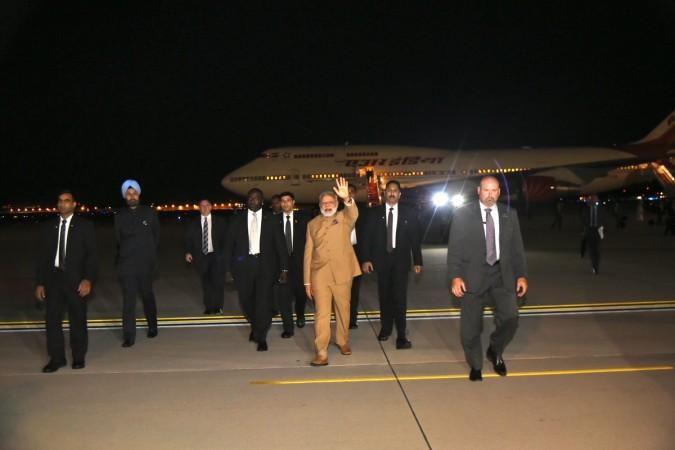
Prime Minister Narendra Modi arrived at Joint Base Andrews in Washington on Sunday, June 25, on the second leg of his three-nation four-day tour to Portugal, US and Netherlands. He will meet US President Donald Trump for the first time since the latter became president in January.
Trump on Sunday called PM Modi a "true friend" and said that he looks forward to the Indian prime minister's visit to the United States. "Look forward to welcoming India's PM Modi to @WhiteHouse on Monday. Important strategic issues to discuss with a true friend!," Trump said in a tweet.
PM Modi also responded to the tweet thanking the US president for the "warm personal welcome."
Thank you @POTUS for the warm personal welcome. Greatly look forward to my meeting and discussions with you @realDonaldTrump. https://t.co/lOfxlLI7v0
— Narendra Modi (@narendramodi) June 25, 2017
Indian Ambassador Navtej Sarna and Charge d'Affaires at US Embassy in Delhi MaryKay Loss Carlson received PM Modi at Joint Base Andrews in Washington. Several Indians living in the US gathered at the air base and chanted slogans like "Modi, Modi" and "Bharat Mata ki Jai." PM Modi also obliged by meeting the Indian community at the air base.
#WATCH PM Narendra Modi meets people from Indian community at the Joint Base Andrews, Washington DC pic.twitter.com/0wWvF1tD1e
— ANI (@ANI_news) June 25, 2017
PM Modi's US itinerary
PM Modi will hold a meeting with top American CEOs later on Sunday and will also deliver his monthly radio address — Mann Ki Baat — live from the US before meeting Trump at the White House on Monday, June 26.
Both Trump and Modi will have a one-on-one meeting on Monday, followed by a delegation-level meeting, a cocktail reception and a working dinner hosted by Trump — the first of its kind under his administration. Modi will be the first foreign dignitary to be hosted by Trump for a dinner at the White House.
"The White House is very interested in making this a special visit. We're really seeking to roll out the red carpet. In fact, the two (leaders) will have dinner, a working dinner at the White House. This will be the first dinner for a foreign dignitary at the White House under this administration. So, we think that's very significant," a senior administration official told reporters at the White House.
White House Press Secretary Sean Spicer said the two leaders "will discuss ongoing cooperation, including counterterrorism, defence partnership in the Indo-Pacific region, global cooperation, burden-sharing, trade, law enforcement and energy."

Tension between US and India
The meeting between the two leaders comes after Trump complained of the increasing US trade deficit with India and also called for reforming the H1B visa system that has proved beneficial to the Indian tech firms. The US president had also lashed out at India for negotiating the Paris climate deal for their advantage and walking away with billion in aid.
The US administration also complained that PM Modi's 'Make in India' platform was protectionist. However, the Indian authorities rejected that claim and complained against the regulatory process for generic pharmaceuticals in the US and also the rules on fruit exports to the country.
US lawmakers request Trump to press Modi on trade and investment
US lawmakers, from both the Republican and Democratic parties, wrote to Trump urging him to press PM Modi to remove the barriers on US trade and investment when they meet on Monday. They said that bilateral economic relationship "severely underperforms" due to failure on India's India's part to enact market-based reforms, Reuters reported.
"Many sectors of the Indian economy remain highly and unjustifiably protected, and India continues to be a difficult place for American companies to do business," they wrote in a letter to Trump.
The lawmakers added that the barriers were imposed on several sectors and included high tariffs, inadequate protection of intellectual property rights and inconsistent and non-transparent licensing and regulatory practices.
Several US goods like solar and information technology products, telecommunications equipment and biotechnology products. among others, remained affected.

















